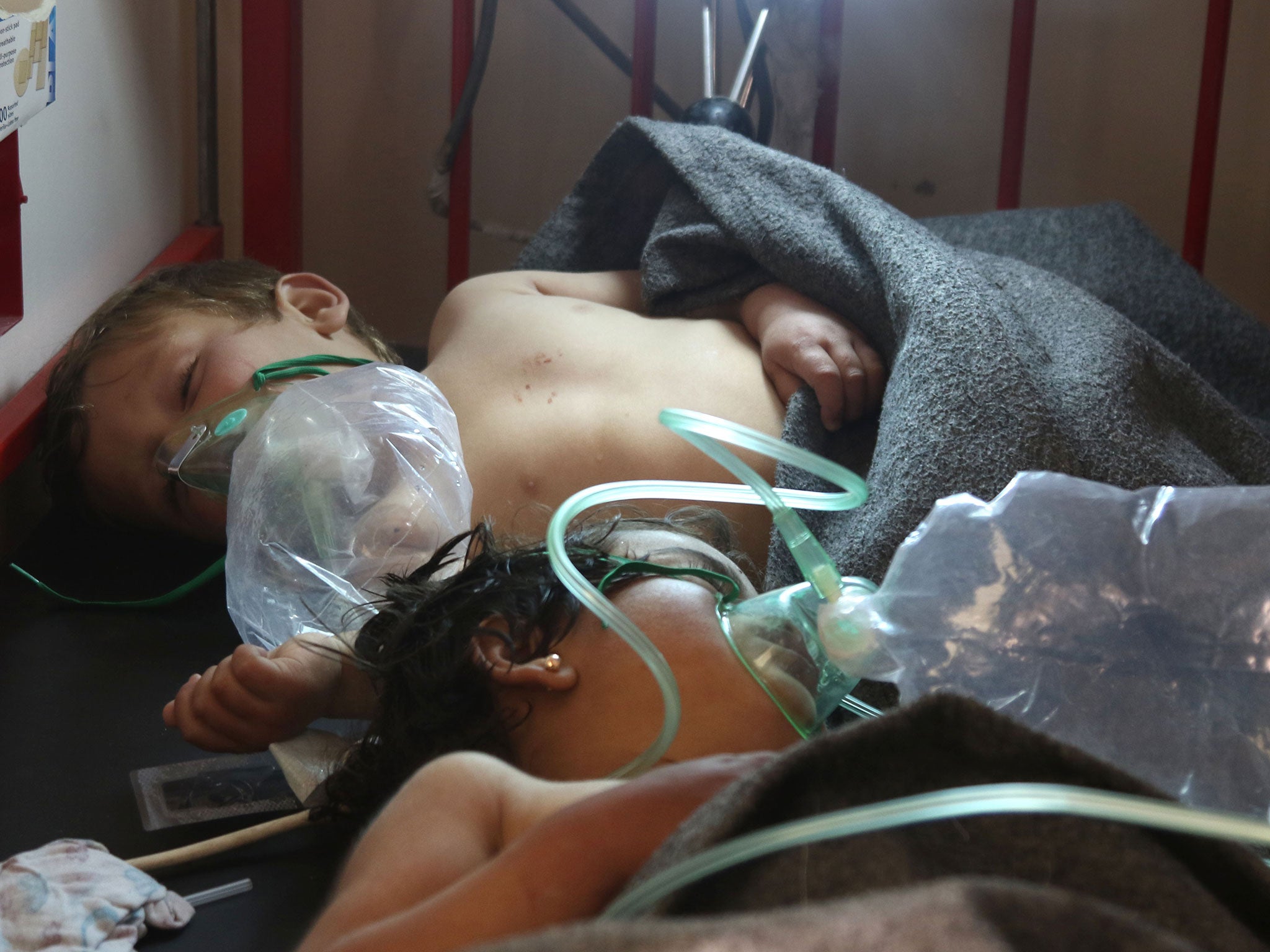Syrian civil war: 'At least 58 killed' in alleged chemical weapons attack in Idlib
Doctor claims patients showing symptoms of sarin gas exposure after attack
Your support helps us to tell the story
This election is still a dead heat, according to most polls. In a fight with such wafer-thin margins, we need reporters on the ground talking to the people Trump and Harris are courting. Your support allows us to keep sending journalists to the story.
The Independent is trusted by 27 million Americans from across the entire political spectrum every month. Unlike many other quality news outlets, we choose not to lock you out of our reporting and analysis with paywalls. But quality journalism must still be paid for.
Help us keep bring these critical stories to light. Your support makes all the difference.
At least 58 people have been reported killed in what witnesses claim was a chemical weapons attack in northern Syria, as world leaders discuss ending the conflict in Brussels.
Doctors in the rebel-held town of Khan Sheikhoun, in Idlib province, said victims started to choke, vomit and faint with foam coming out of their mouths.
The UK-based Syrian Observatory for Human Rights said at least 11 children and several women were among dozens killed, with reports of "suffocation" following the bombings.
It put the death toll at 58 but warned the number could rise as several victims remained in a serious condition.
Dr Shajul Islam said the hospital where he worked was filling up with patients, posting footage online of victims he said showed symptoms of exposure to sarin.
"We have samples," he wrote. "Will anyone care? Who will stop it?"

Rescue workers from the White Helmets group were seen wearing gas masks to protect themselves while treating people lying amid rubble on the ground.
They reported at least 20 civilians among those affected, saying chlorine gas may have been responsible.
Activists posted video online claiming to show the moment the bombs struck, alleging they were dropped by Syrian air force helicopters as clouds of smoke rose into the air.
It came little over a week after another alleged chemical attack hit a hospital in the town of Latamneh, just 14 miles away.
Médecins Sans Frontières (MSF), which supports the facility, said a bomb dropped by a helicopter struck the entrance on 25 March.
“Immediately after the impact, patients and staff reported suffering severe respiratory symptoms and burning of mucous membranes – symptoms consistent with an attack using chemicals,” a spokesperson said.
The hospital’s orthopaedic surgeon was among two people killed in the attack, leaving just two orthopaedic surgeons for a population of around 120,000 people, and the clinic was put out of service for three days.
Bashar al-Assad's forces have been accused of repeatedly using the nerve agent during the six-year civil war, including in a massacre in Eastern Ghouta that almost sparked military intervention by the UK in 2013.
Damascus has denied the allegations, while Isis is also alleged to have used chemical weapons including chlorine and mustard gas.
Idlib province, in north-western Syria, is a key battleground between regime forces and rebels including Islamist factions linked to al-Qaeda.
It was the destination for rebel fighters evacuated from eastern Aleppo earlier this year, and is widely expected to be Assad's next major target.
Khan Sheikhoun sits near the frontline between regime and opposition held territory, on a key motorway linking the city of Hama with rebel strongholds to the north.
The alleged chemical attack came as world leaders gathered in Brussels for a conference organised by the EU and UN on "supporting the future of Syria".
Successive rounds of peace talks in Geneva have so far failed to produce a lasting ceasefire in the Syrian conflict, which shows no sign of ending in its seventh year of bloodshed.
Calls for Assad’s removal – once the stated priority for the US, UK, Turkey and other Nato members – has waned in priority since the rise of Isis and other extremist groups.
Donald Trump’s ambassador to the UN, Nikki Haley, claimed the US had not ruled out cooperating with Assad to defeat Isis but insisted he was “not our number one person to talk to”.
Subscribe to Independent Premium to bookmark this article
Want to bookmark your favourite articles and stories to read or reference later? Start your Independent Premium subscription today.

Join our commenting forum
Join thought-provoking conversations, follow other Independent readers and see their replies
Comments